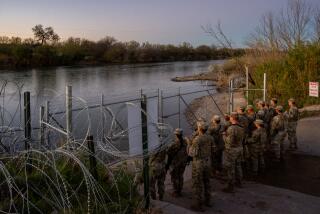The Cutting Edge: COMPUTING / TECHNOLOGY / INNOVATION : Overpopulation Should Be Popular Topic
- Share via
Science, like every other field of human endeavor, sometimes tends to push the toughest questions aside.
Of all the issues confronting the survival of the human species, and the quality of life we enjoy, surely there can be none more important than the simple fact that the Earth’s population is growing so rapidly we may soon exceed the “carrying capacity” of the planet. Experts disagree on the numbers, but even conservative estimates suggest we may be there as early as the middle of the next century.
It may be true that commissions and research organizations around the globe are looking at the problem, but it is equally true that the issue does not have the kind of priority it deserves. We hear a lot of talk about the ozone hole, deforestation, degradation of the environment and so on. But population studies are relegated to the back shelves of our libraries, and I don’t see any politicians running for office on the strength of concerns about a population explosion that will almost surely lead to human suffering on a scale we cannot even imagine.
Joel Cohen, head of the Laboratory of Populations at Rockefeller University in New York City, has devoted a lifetime to researching this crucial issue, and his conclusions are devastating. Cohen refuses to put a number on the Earth’s “carrying capacity” because there are so many variables, including such fundamental things as the quality of life that we would find acceptable. But most experts believe the maximum number is probably in the range of 12 billion to 13 billion.
Citing projections by the United Nations, Cohen says in a book released this week, “How Many People Can the Earth Support?,” that “if human populations continued to grow at 1990 rates in each major region of the world, then the population would increase more than 130-fold in 160 years, from about 5.3 billion in 1990 to about 694 billion in 2150.”
That’s 694,000,000,000 human souls, a number so great it is incomprehensible.
Furthermore, Cohen says, if “from 1990 onward the average couple gradually approached a level of fertility just one-tenth of a child more than required to replace themselves, world population would grow from 5.3 billion in 1990 to 12.5 billion in 2050 and 20.8 billion in 2150.”
In my lifetime--and I certainly don’t consider myself an old man--I have seen the world’s population nearly triple. This is a problem of staggering proportions, and it sometimes seems as though we have all thrown up our hands and said there’s nothing we can do about it.
Cohen has taken part in scores of conferences on population patterns where you would expect the issue to receive top billing. After all, these meetings attract the people who are the most knowledgeable and thus the most concerned about the issue. But when he looked at more than 200 symposiums held at the 1992 and ’93 annual meetings of the Population Assn. of America, he found that “not one session dealt with estimating or defining human carrying capacity for any region of the Earth.” That has improved slightly--some sessions will touch on the issue at an upcoming meeting of the association, Cohen said in an interview.
Cohen said he believes we have avoided the issue for two main reasons.
“Until recently, people were really under the cloud of the atomic bomb, and there was a feeling that if we are going to wipe ourselves out with a nuclear war, population is a secondary issue.
“I think the second reason is it deals with very personal and private issues,” Cohen said. “When we talk about population, we are talking about sex, birth, marriage and death, and all the fundamental things that a lot of people have very strong emotions about . . . . there are cultural and religious obstacles to talking about some of these issues.”
Cohen concedes that there may be some reluctance on the part of government leaders as well as of scientists to jump into a problem they fear they cannot solve. Long-term projections have so many variables, including subtle changes in human attitudes, that few feel secure in estimating the depth of the abyss that lies before us.
Yet despite the fact that so many variables make the science extremely difficult, the world’s leaders need scientists to come up with as many hard facts as possible. Of course it’s hard, but answering the tough questions is what science is supposed to be about.
My fear is that scientists, like most of us, are more interested in instant gratification than in devoting their lives to studying a thorny and risk-laden issue. No one likes the prospect of spending his or her final years apologizing for having failed to see trends that could appear with great clarity in hindsight.
Cohen is trying to issue a wake-up call to his fellow Americans, partly because he doubts that many here understand the scale of the problem.
“They don’t know what it’s like to walk through the streets of Calcutta and step over bodies of at least half a million people who don’t have anyplace to go. They don’t know what it’s like to get out of a vehicle in East Africa and have a child come up to you, a friendly child, and there are flies on the eyes of that child. The child doesn’t blink, because the flies are always there.”
Before we can really tackle the problem, we need scientists to do their part. After all, as Cohen notes, nobody today really knows just how many of us this old planet can stand.
Lee Dye can be reached by e-mail at 72040.3515@compuserve.com.






